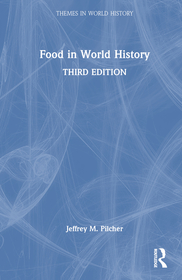
Food in World History
Series: Themes in World History;
- Publisher's listprice GBP 135.00
-
64 496 Ft (61 425 Ft + 5% VAT)
The price is estimated because at the time of ordering we do not know what conversion rates will apply to HUF / product currency when the book arrives. In case HUF is weaker, the price increases slightly, in case HUF is stronger, the price goes lower slightly.
- Discount 20% (cc. 12 899 Ft off)
- Discounted price 51 597 Ft (49 140 Ft + 5% VAT)
Subcribe now and take benefit of a favourable price.
Subscribe
64 496 Ft

Availability
Estimated delivery time: In stock at the publisher, but not at Prospero's office. Delivery time approx. 3-5 weeks.
Not in stock at Prospero.
Why don't you give exact delivery time?
Delivery time is estimated on our previous experiences. We give estimations only, because we order from outside Hungary, and the delivery time mainly depends on how quickly the publisher supplies the book. Faster or slower deliveries both happen, but we do our best to supply as quickly as possible.
Product details:
- Edition number 3
- Publisher Routledge
- Date of Publication 15 June 2023
- ISBN 9781032364513
- Binding Hardback
- No. of pages174 pages
- Size 229x152 mm
- Weight 453 g
- Language English 470
Categories
Short description:
Now in its third edition, Food in World History explores culinary cultures and food politics throughout the world, from ancient times to the present day, with expanded discussions of industrialization, indigeneity, colonialism, gender, environment, and food and power.
MoreLong description:
Now in its third edition, Food in World History explores culinary cultures and food politics throughout the world, from ancient times to the present day, with expanded discussions of industrialization, indigeneity, colonialism, gender, environment, and food and power.
It examines the long history of globalization of foods as well as the political, social, and environmental implications of our changing relationship with food, showing how hunger and taste have been driving forces in human history. Including numerous case studies from diverse societies and periods, such as Maya and Inca cuisines and peasant agriculture in the early modern era, Food in World History explores such questions as:
- What social factors have historically influenced culinary globalization?
- How did early modern plantations establish patterns for modern industrial food production?
- How will the climate crisis affect food production and culinary cultures?
- Did Italian and Chinese migrant cooks sacrifice authenticity to gain social acceptance in the Americas?
- Have genetically modified foods fulfilled the promises made by proponents?
With the inclusion of more global examples, this comprehensive survey is an ideal resource for all students who study food history or food studies.
Praise for previous editions:
"I had been waiting for this second edition impatiently. Jeffrey Pilcher is a five-Michelin-star-rated food historian and Food in World History is just the perfect food history textbook; distilling the most relevant literature in the field into an essential, intelligent, and tremendously engaging narrative."
Simone Cinotto, University of Gastronomic Sciences, Pollenzo, Italy
"Jeffrey Pilcher has provided readers with an appetizing introduction to the rapidly growing field of food history. Written in his well-known lively and efficient prose, Professor Pilcher weaves together a truly global history of food, one that pays respects to key aspects of the discipline of world history—cross-cultural exchange, the neolithic and pastoral revolutions, the rise of states and empires, and changing categories of class and gender, all remarkably balanced with respect to diverse regions. Food in World History will serve as a guidebook to aficionados of food history at all levels, from the casual reader to professional researchers."
Rick Warner, Wabash University, Crawfordsville, USA
"Food in World History is compulsory reading for the food scholar. Written in concise language and an engaging style, this new edition has added discussion of gender, indigeneity, corporate control over food and marketing, food authenticity and exoticism in tourism, and the influence of social media on food practices."
Cecilia Leong-Salobir, University of Western Australia, Perth, Australia
MoreTable of Contents:
Chapter 1: The First World Cuisine / Chapter 2: The Columbian Exchange / Chapter 3: Sugar, Spice, and Blood / Chapter 4: Nouvelles Cuisines / Chapter 5: Moral and Political Economies / Chapter 6: The Industrial Kitchen / Chapter 7: Cuisine and Nation Building / Chapter 8: Empires of Food / Chapter 9: Migrant Cuisines / Chapter 10: Guns and Butter / Chapter 11: The Green Revolution / Chapter 12: McDonaldization and Its Discontents / Chapter 13: Culinary Pluralism / Conclusion
More



